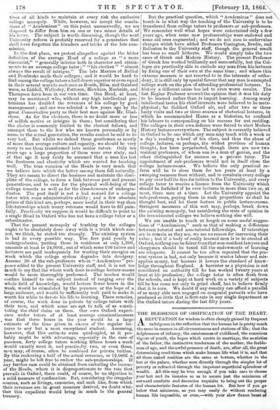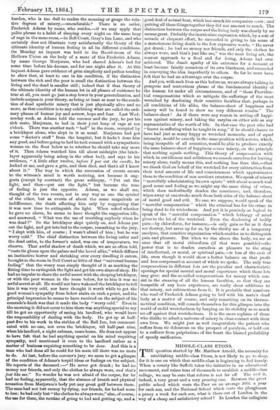but or the palace, whether seen directly through the simpler
lot of poverty or refracted through the impotent superficial splendour of wealth. All this may be true enough if you take care to choose your hut and its inmates so as to secure just the minimum of outward comforts and decencies requisite to bring out the proper and characteristic features of the human lot. But how if you go ther this expedient would bring in much to the general below that minimum, as you may easily do without rendering burden, who is too dull to realize the meaning or gauge the rela- tive degrees of misery,—unendurable? There is an ostler, Frederick Adams by name, who resides,—if we may apply that polite phrase to a habit of sleeping every night on the same heap of rags in the same room,—in Bell Court, Gray's Inn Lane, and who certainly does not illustrate very satisfactorily the theory of the ultimate identity of human feeling in all its different conditions. On Monday an inquest was held in the Board-room of the Holborn Union on the body of a mate of this Frederick Adams, by name George Marjoram, who had shared Adams's bed for some time before his decease, and for one night after it. At this inquest Adams gave evidence of grim simplicity and pathos tending to show that, at least to one in his condition, if the distinction between the rich and the poor is small the distinction between the living and the dead is smaller still ; indeed that if that theory of the ultimate identity of the human lot in all phases of existence be true at all, you must go just a step lower in your generalization, and include corpses in your theory, as being at least as near to the condi- tion of dead apathetic misery that is just physically alive and no more, as that condition is to any exhibiting what are called the ordi- nary phases of human joy and sorrow, hope and fear. Last Wed- nesday week, as Adams told the coroner and the jury, he put his sick mate, Marjoram, to bed in their joint heap of rags at ten o'clock. There was another such " bed" in the room, occupied by a bricklayer alone, who slept in it as usual. Marjoram had got some "doctor's stuff" from the hospital, but it hadn't done him any good, and before going to bed he took counsel with a sympathetic woman on the floor below as to whether he should take any more of it. Then Adams watched him till about midnight (the brick- layer apparently being asleep in the other bed), and says in his evidence, "A little after twelve, before I put out the candle, he looked at me, and gave a grin, and then died, and that's all I know about it." The way in which the succession of events occurs to the witness's mind is worth noticing, not because it sug- gests (except by contrast) the great soliloquy, " Put out the light, and then—put out the light," but because the tone of feeling is just the opposite. Adams, as we shall see, thought of the two events, not in any way as one the symbol of the other, but as events of about the same magnitude or indifference, the death affecting him only by suggesting that it was now time to extinguish the light. When asked whether he gave no alarm, he seems to have thought the suggestion idle, and answered, " What was the use of troubling anybody when he was dead ?" So the bricklayer slept quietly on, and Adams put out the light, and got into bed to the corpse, remarking to the jury, " I slept with him, of course ; I wasn't afraid of him ; but he was werry cold." The chief distinction between the living ostler and the dead ostler, to the former's mind, was one of temperature, we observe. That awful shadow of death which, we are so often told, "casts its gloom upon the palace and the hovel alike," which diffuses an instinctive horror and shrinking over every dwelling it enters, brought to the room in Bell Court so little of that "universal human feeling" that the weary man simply thought of it as marking the fitting time to extinguish the light and get his own shareof sleep. He had no impulse to share the awful secret with the sleeping bricklayer, or with the poor woman in the room below, for to him it was no awful secret at all. He would not have wakened the bricklayer to tell him it was very cold, nor have thought it worth while to get the good woman's sympathy from below stairs on such a point, and the principal impression he seems to have received on the subject of his comrade's death was that it made the body "werry cold." Even in the morning it did not occur to him there was anything special to say till he got an opportunity of seeing his landlord, who would have the responsibility of dealing with the body. He got up at half- past five to his work in the stables of the Bell Inn, but communi- cated with no one, not even the bricklayer, till half-past nine, when his landlord, a night cabman, came home. He does not appear to have felt that he had anything special on his mind requiring sympathy, and mentioned it even to the landlord rather as a matter of business requiring something to be done. And this is a man who had done all be could for his mate till there was no more to do. At last, before the coroner's jury, we seem to get a glimpse of the condition of Adams's torpid ideas or feelings on the subject. He reports of the deceased :—" He never got drunk ; he had no money nor friends, and only the clothes he always wore, and that's just like me." No wonder he was not afraid of the corpse, for he had no feeling, apparently, that the absence of breath and physical sensation from Marjoram's body put any great gulf between them. The man had not lost money by dying, nor friends, for he had none to lose; he had only lost "the clothes he always wore," also, of course, the use for them, the routine of going to bed and getting up, and a good deal of animal heat, which last struck his companion most ; and putting all these things together they did not amount to much. The distinction between the corpse and the living body was clearly by no means great. Probably the inarticulate expression which, by a sort of miracle of eloquent effort, he succeeded in giving to his sense of a monotonous living death in the few expressive words, " He never got drunk ; he had no money nor friends, and only the clothes he always wore, and that's just like me," was the most living act, the nearest approach to a final end for living, Adams had ever achieved. The dumb apathy of his existence for a moment at least became faintly conscious of its own blankness, and succeeded in conveying the idea imperfectly to others. So far he must have felt that he had an advantage over the corpse.
And yet, with such lives as this before us, we are always talking in pompous and sententious phrase of the fundamental identity of the human lot under all circumstances, and of "those Providen- tial compensations which so mitigate the sufferings of the most wretched by deadening their sensitive faculties that, perhaps in all conditions of life alike, the balance-sheet of happiness and misery will be found to show no very different results." The balance-sheet ! As if there were any reason in setting off happi- ness against misery, and taking the surplus on either side as any representative of the worth of life. In that case the poet who had "learnt in suffering what he taught in song," if he should chance to have had just as many happy as wretched moments, and of equal intensity, would be exactly in the same position with a stone, which, being incapable of all sensation, would be able to produce exactly the same balance-sheet of happiness versus misery, on the principle that nothing equals nothing. This theory of compensation with which in ouridleness and selfishness we console ourselves for leaving misery alone, really means this, and nothing less than this,—that we thank God ou behalf of the wretched for every subtraction from their total amount of life and consciousness which approximates them to the condition of non-sentient creatures. We speak of misery " mercifully administering its own opiate " with about as much real good sense and feeling as we might say the same thing of crime, which does undoubtedly deaden the conscience, and, therefore, wipes away at one stroke much from both sides of the balance-sheet of moral good and evil. No one, we suppose, would speak of the " merciful compensation " which the criminal has for his crime in being dead to its wickedness. And yet it is precisely as logical to speak of the "merciful compensation" which lethargy of mind gives to the lot of the wretched. Even the deadening of bodily pain—by chloroform, for instance,—is only gain so far as it does not destroy, but saves up for us, by the thrifty use of a temporary anodyne, that sensitive organization which enables us to distinguish pain and pleasure. But when we rise above the body, we see at once that all moral chloroform (if that were possible)—the power that is to deaden ourselves at pleasure to the sting of intellectual, or moral, or spiritual pain,—is loss of the ends of life, even though it would show a better balance on that profit and loss compensation account of which we spoke. The only true compensations in different lots are the peculiar and characteristic openings for special mental and moral experience which those lots may give; and the so-called compensations for misery which con- sist in the stunning of all the human faculties, so that they are incapable of any keen experience, are really sheer additions to that misery, not subtractions from it. It is probable that numbers who read of Frederick Adams going to bed with his mate's dead body as a matter of course, and only remarking on its thermo- metrical condition, will console themselves for this glimpse into the world of stolid wretchedness by harping on its stolidity as so much set-off against that wretchedness. It is the mere sophism of those who dislike to admit a universe of misery in close contact with their own lives. We might just as well congratulate the patient who suffers from tic doloureux on the prospect of paralysis, or hold out to a sufferer from palpitations of the heart the blessed probability of speedy ossification.































 Previous page
Previous page